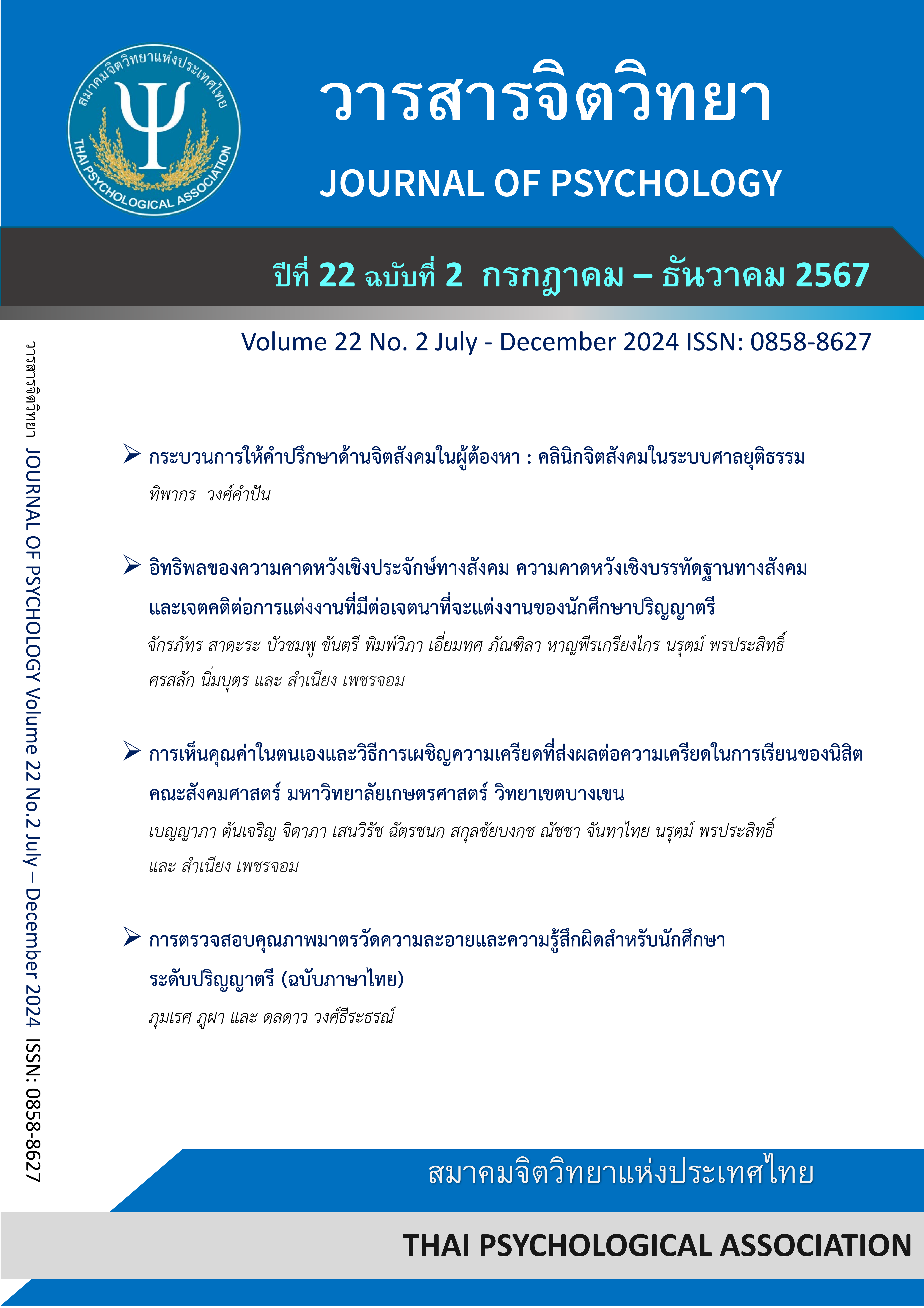Self-esteem and coping strategies that indicate an academic stress among Undergraduate Students at the Faculty of social science at Kasetsart University Bangkhen Campus
Keywords:
Self-esteem, Coping strategies, Academic stress , Undergraduate StudentsAbstract
Abstract
Nowadays, education in Thailand is highly valued and prioritized, leading to continuous educational development. University students are at a stage in life where they face numerous changes, including academic transitions, which often result in an academic stress. This research aims to predict a study of stress through self-esteem and coping strategies. The participants were 208 students from the Faculty of Social Sciences at Kasetsart University, Bangkhen Campus. The sample selection was based on an accidental sampling technique which is 5.86% of the total population. The data were analyzed by using statistical methods, including average, percentage, and Pearson’s product moment coefficient. The statistical significance level was .001. The data were collected using a questionnaire on self-esteem, coping strategies, and an academic stress, with a reliability range of .82 to .93. The result revealed that self-esteem was a significant negative predictor of academic stress (β = -.464, p < .001). However, problem-focused and emotion-focused coping were not predictors of an academic stress.
References
เอกสารอ้างอิง
จันทรา อุ้ยเอ้ย และวรรณกร พลพิชัย. (2561). การศึกษาความเครียดและวิธีการเผชิญความเครียดของ
นักเรียนระดับมัธยมศึกษาตอนปลายในอำเภอเมือง จังหวัดตรัง. วารสารนาคบุตรปริทรรศน์
มหาวิทยาลัยราชภัฏนครศรีธรรมราช, 10(ฉบับพิเศษ), 94-105.
นิธิสนี รุจิรังสีเจริญ, นิดา ลิ้มสุวรรณ, ศิริไชย หงษ์สงวนศรี, และ บัญญัติ ยงย่วน. (2564). ปัจจัยที่สัมพันธ์
กับระดับความเครียดของนักเรียนระดับมัธยมศึกษาสังกัดกรุงเทพมหานคร. วารสารสมาคมจิตแพทย์
แห่งประเทศไทย, 66(1), 53-68.
ปริญญา หวันเหล็ม และ ชาคินัย หมีเทศ. (2554). การบูรณาการเพื่อสร้างคุณค่าในตนเองสำหรับผู้สูงอายุ
ในศตวรรษที่ 21 ผ่านรูปแบบอาสาสมัครดูแลสุขภาพผู้สูงอายุ: กรณีศึกษาเทศบาลตำบลปลักแรด
อำเภอบางระกำ จังหวัดพิษณุโลก. วารสารวิเทศศึกษา, 12(1). 89-116.
พิชญา สุรพลชัย. (2566). โครงการสำรวจพฤติกรรมสุขภาพของนิสิตนักศึกษาในมหาวิทยาลัย. สถาบันวิจัย
สังคม จุฬาลงกรณ์มหาวิทยาลัย. https://dol.thaihealth.or.th/Media/Pdfview/87a526d4-e2b0-ed11-80fd-00155d1aab66
พิมพ์ชนก วชิรปราการสกุล. (2564). การเห็นคุณค่าในตนเองและความรู้สึกเครียดในนิสิตคณะสัตว
แพทยศาสตร์ [วิทยานิพนธ์ปริญญามหาบัณฑิต]. จุฬาลงกรณ์มหาวิทยาลัย.
https://doi.org/10.58837/CHULA.THE.2021.1084
สุภาภัทร ทนเถื่อน. (2553). การศึกษาความเครียดและวิธีเผชิญความเครียดของนักเรียนมัธยมศึกษาตอน
ปลาย [วิทยานิพนธ์ปริญญามหาบัณฑิต]. มหาวิทยาลัยศรีนครินทรวิโรฒ.
แสงรุ้ง สุขจิระทวี. (2551). ความเครียด การเผชิญความเครียด ปัจจัยส่วนบุคคล และคุณภาพชีวิตของ
ผู้ป่วยมะเร็งปอดที่ได้รับยาเคมีบำบัด. [วิทยานิพนธ์ปริญญามหาบัณฑิต]. มหาวิทยาลัยมหิดล.
https://doi.org/10.14457/MU.the.2008.235
อังศินันท์ อินทรกำแหง. (2555). การสังเคราะห์งานวิจัยที่เกี่ยวกับความเครียดและการเผชิญความเครียด
ของคนไทย. วารสารพฤติกรรมศาสตร์, 14(1), 135-150.
Alla K. Bolotova, & Milana R. Hachaturova. (2013). The role of time perspective in coping
behavior. Psychology in Russia State of Art. 6(3), 120-131.
https://doi.org/0.11621/pir.2013.0311
Ivancevich, J. M., Konopaske, R., & Matteson, M. T. (2013). Organizational Behavior and
Management (10th ed.). New York: McGraw-Hill Higher Education.
Lazarus, R., & Folkman, S. (1984). Stress appraisal and coping. New York: Springer Publishing
Co.
Rosenberg, M. (1965). Society and the Adolescent Self-Image. United States of America: Quinn &
Boden Company.
Published
How to Cite
Issue
Section
License
Copyright (c) 2025 Thai Psychological Association

This work is licensed under a Creative Commons Attribution-NonCommercial-NoDerivatives 4.0 International License.
บทความที่ได้รับการตีพิมพ์เป็นลิขสิทธิ์ของสมาคมจิตวิทยาแห่งประเทศไทย
ข้อความที่ปรากฎในบทความแต่ละเรื่องในวารสารวิชาการเล่มนี้เป็นความคิดเห็นส่วนตัวของผู้เขียนแต่ละท่านไม่เกี่ยวข้องกับสมาคมจิตวิทยาแห่งประเทศไทย แต่อย่างใด ความรับผิดชอบองค์ประกอบทั้งหมดของบทความแต่ละเรื่องเป็นของผู้เขียนแต่ละท่าน หากมีความผิดพลาดใด ๆ ผู้เขียนแต่ละท่านจะรับผิดชอบบทความของตนเองแต่ผู้เดียว






